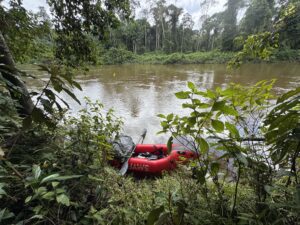Fifty-one-year-old French swimmer Benoit Lecomte has just embarked on an 8,800km swim across the Pacific Ocean. Lecomte set off into the surf from Choshi in Japan on June 5, aiming to swim for six to eight months on route to San Francisco on the U.S. west coast.
During his odyssey, Lecomte will have to contend with rough seas, strong currents, jellyfish, and the threat of inquisitive sharks. The journey marks the first attempt by anybody to swim the Pacific, and the expedition has been six years in the making for Lecomte.

“The mental part is much more important than the physical.” Lecomte preparing to begin his swim in Japan. Photo: AFP
Lecomte plans to swim for an average of 8 to 10 hours per day, resting on his support boat at night in order to take on calories and sleep. He’ll be mirroring the tactics he used in 1998 when he completed a 6,400km swim across the Atlantic. On that project, he set off from Hyannis, Massachusetts, in the U.S., and made landfall in Brittany, France, after 73 days.
That earlier journey was not recognized by the Guinness Book of World Records due to the uncertainty surrounding the distance he actually covered swimming. Prevailing currents may have carried him substantial distances while on the boat. This time, Lecomte will attempt to remove room for skepticism. He will use a GPS tracker to ensure that he accurately records how many miles he swims and that he is returned to the water at precisely the same point he left whenever he stops to eat and sleep.

Lecomte will be followed by a team on the Discovery, his support boat. Photo: The Longest Swim
Lecomte claims that monotony may be his biggest challenge. His daily regime will remain pretty constant, with eight hours of swimming followed by stops to rest on the boat, during which he will try to take on his target of 8,000 calories. For roughly the first third of his journey, he will make use of the Kuroshio current that runs along Japan’s east coast, easing the strain on his body and potentially increasing his speed by up to five knots.
Lecomte hopes to raise awareness about climate change, as well as our use of plastics. Fittingly, his route will take him through the “Great Pacific Garbage Patch” between Hawaii and California, a colossal vortex of trash comprising an estimated 1.8 trillion pieces of plastic. Lecomte and his team are collaborating with no fewer than 27 scientific institutions, with researchers studying everything from the effects of the Fukushima nuclear explosion on the ocean to how extreme exercise effects the human heart.
Previous / Links:
The Longest Swim Official Website






